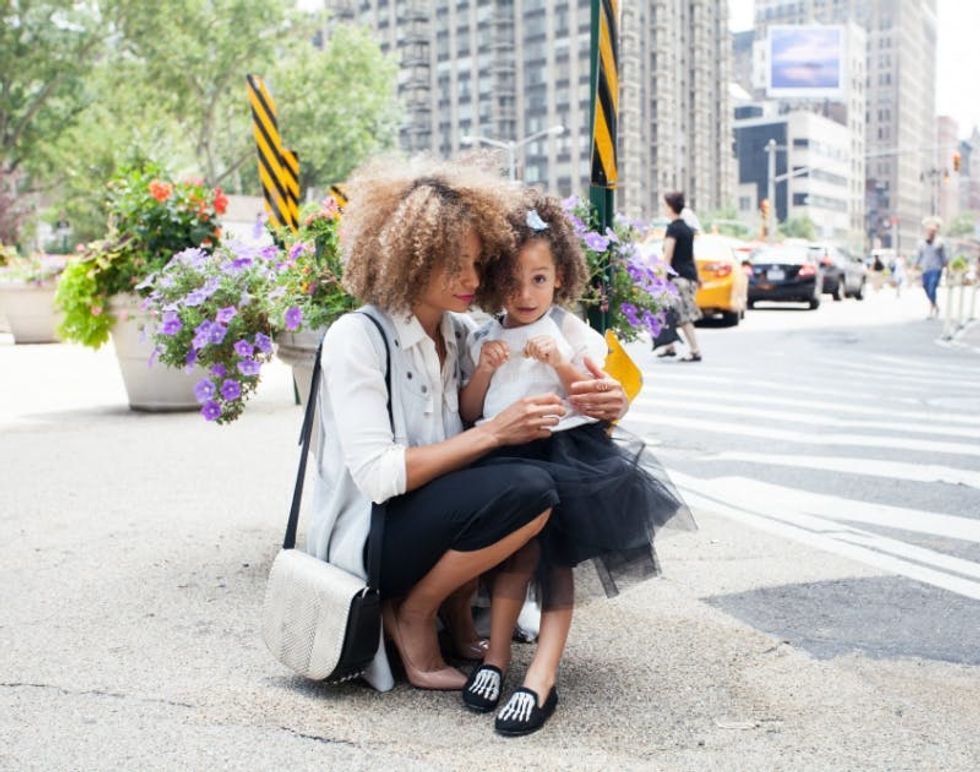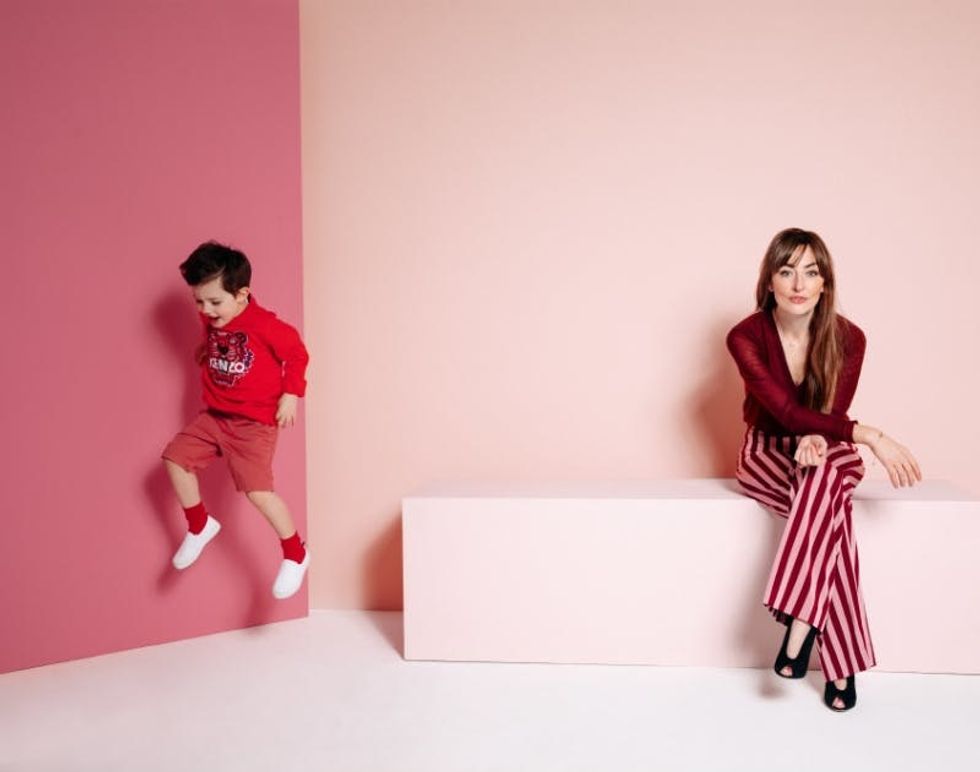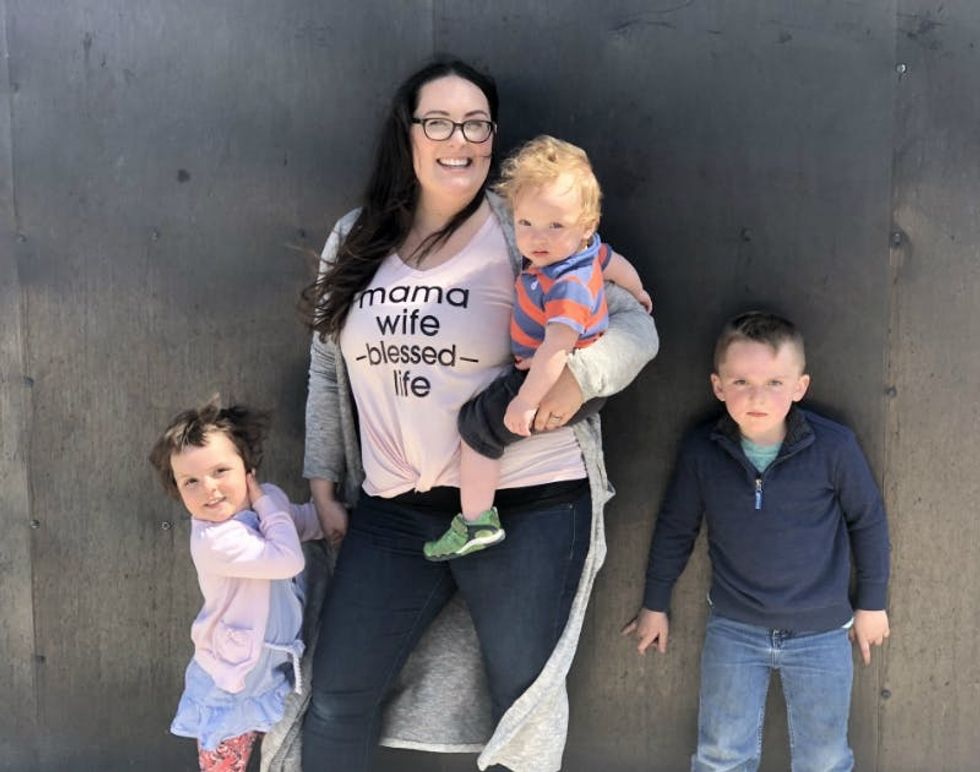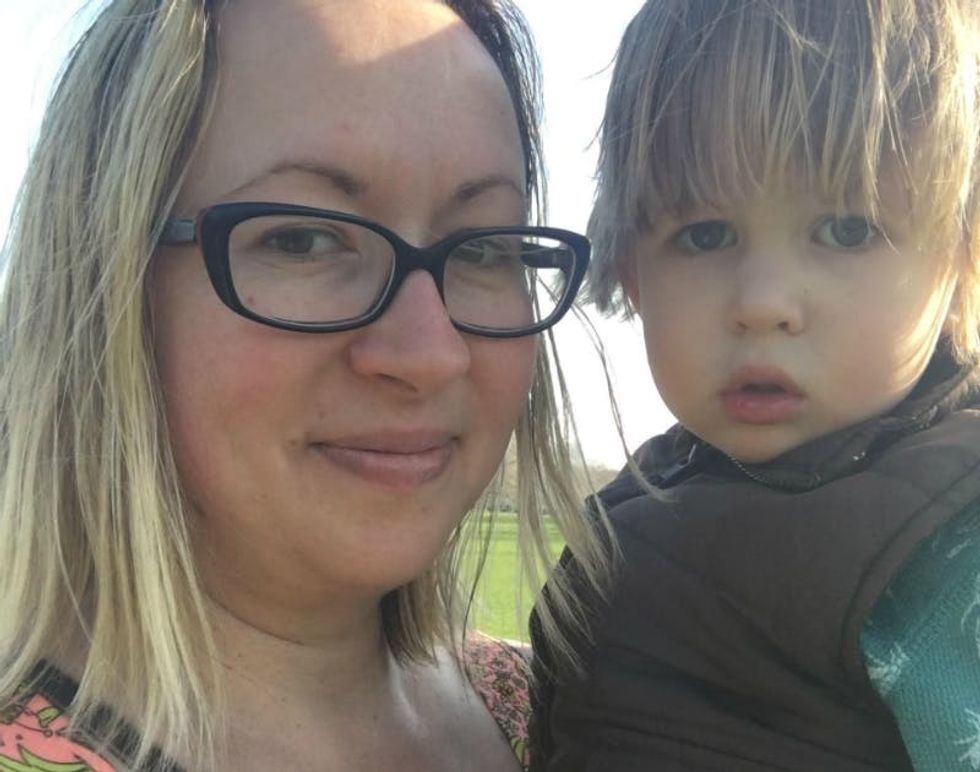Women speak out on the tough realities of new motherhood.
6 Awesome Moms Help Break Down The Stigma About Maternal Mental Health By Sharing Their Postpartum Stories


The struggle is real. No matter how prepared you are, how supportive your partner and family are, no matter how many plans and backup plans you have for handling the experience of being a new mom, one thing you can’t plan for is where your emotions are going to take you during those first sleep-deprived weeks and months. While the stigma around talking about mental health has been steadily decreasing, it’s still a risky and difficult thing to confront. For moms, the stakes are even higher. The fear of being labeled a "bad" mother and the scary consequences that come with that are very real. There is an extra layer of anxiety when it comes to maternal mental health, and that can create barriers for women looking to access support.
Many of these new moms have sought out online communities to connect with other women going through the same intimidating and sometimes scary moments that come with having a baby.
“I was one of the first of my friends to have a baby, so while I was up at 2 am breastfeeding, they were out on the town. It was was hard to admit, but I was feeling isolated,” says Michelle Kennedy, the co-founder & CEO of Peanut, an app that connects moms the way Bumble and Tinder connect singles with dates. “I would find myself scrolling through blogs in the middle of the night looking for baby advice and also longing for someone to talk to during those late-night feedings. The problem was, everything I saw reverted to anonymous web forums and blogs with condescending language that made me feel like the only identity I had now was ‘mommy.’”
In an effort to normalize those less-than-blissful postpartum experiences and anxiety-filled headspaces, six brave women shared their stories of insecurity with us, and tell us where they went to find support and how it helped.

“Conversations around anxiety, isolation, and mental health started sprouting up [on Peanut Pages] within the more expected conversations moms are having on the app surrounding work, money, love, and sex. Noticing a couple chains of conversations around these topics within the app, I posted a question about it in Pages myself: ‘Mental Health. Are we talking about it enough?’ The responses were astonishing. Women commented on the post describing how anxiety was the number one complication they felt upon becoming a new mother. They also felt that during pregnancy, conversations should be directed towards postpartum depression; what it is, what the symptoms and signs are, and what you can do about it. The overwhelming response to these topics in Peanut highlights that women want and need to be having more of these conversations.” Michelle, London, England

“We moved three and a half hours from our hometown, for my husband's work. He traveled, and spent long hours at work. Not only did it feel lonely in a new city, but we had no family or friends to pass time with. I still had absolutely no help, but before we weren't contained to a house, in a town we barely know, and we had friends to ease the stress at times. I was even more caught up in my head, afraid to tell others about my mental state. It took a lot for me to share it with my husband, and eventually with our family and friends. It was scary because I didn't want to be judged for being weak, or incapable of caring for my children. I didn't want others to think we chose to have three children, and I, as a mother, could not tend to the needs of my children. I spent weeks, crying, in physical pain, blanketed in so much inner anger, that projected to my oldest child. It was such a difficult time, and still is. It wasn't until I forced myself to write [online] about my struggle, that I realized how important it was for others to read about it, and know there are so many women who are going through the same struggle.” Maria, Toronto, Canada

“When we’re feeling confused, angry, scared, anxious and lost, all we really need is validation. It’s important to know that we are NOT crazy and that we’re not alone. We need to share, vent, cry, and laugh with other women who are going through the same things. Doctors, therapists, friends, and spouses are extremely important, however it feels good to hear other moms going through the same thing cheer you on like ‘I hear you, you’re doing good. You got this mama!’
Obviously, Peanut doesn’t replace a doctor’s diagnostics, however it can provide that sense of validation to so many moms who feel lost. The fact that you can post anonymously on the app was a huge factor for me. Some women might not have the great support system that I had or a doctor who really takes the time to listen... It was important for me to find people that I could find others to relate to right after experiencing a panic attack without having leave the house or even in bed.
Mamas: it isn’t always rainbows and butterflies. Don’t be fooled by social media, it isn’t always picture-perfect. Follow your instinct, reach out and deal with each situation in a way that you feel is best for you and your child. You are stronger than you think you are.” Cindy, Mount Shasta, California

“I started to feel like I was failing at every single piece of ‘motherhood’ — couldn't handle the birth, couldn't breastfeed, birth injuries weren't healing quickly, could not tie that f*&#ing wrap properly — it was all failure all the time. But even with all of these frustrations, I knew that I had had a very lucky experience overall. I got pregnant immediately, when I wanted to, never threw up from morning sickness, stayed active and carried without intervention for 40 weeks and my labor started on its own. My child was born healthy and we were released the same day to go home. Knowing how many other parents struggle through all of the things that had gone well for me made me feel like I shouldn't complain or make too big a deal out of the intense shame and anxiety I was feeling…
My partner was great at reminding me that I wasn't actually failing, and I was so lucky to have my mom available whenever I needed her. But the bulk of the emotional support I received was from people who participated in a Facebook group for parents with babies that I was added to by a friend a month or so before my child was born. Online parenting groups have a bad rap for being extremely judgemental and sanctimonious, but this one was a rare breed of group where the participants rarely if ever expressed judgment and were always quick to respond to panicked posts with solidarity, commiseration, and unconditional cheerleading. I was able to see that what my child and I were going was through completely normal, and I was also able to hear how everyone and their kids grew out of things and moved on, how their confidence grew along with their babies. It was a completely safe space to talk about anything, and as my kid grew and I was able to start providing that context and support to newer parents, my confidence grew more. The kindness and generosity of the parents in that group was unexpected and I really do believe it saved me from a lot of despair.” Tallulah, Toronto, Canada

“As a mother of three young children, my mental health has changed with each child. Awareness, experience and growth throughout the mothering process has been the biggest factor for myself and my ‘tribe’ of support. I want to be an advocate for mothers who are still struggling and bring awareness to the public. It’s uncomfortable, but it’s more common than people are willing to admit and/or accept, and there is no ‘face of maternal mental health.’ We are all in this together and should be supporting each other. I want to share real and raw life moments in motherhood, and maternal mental health is not a pretty or Instagram-worthy picture of motherhood, but it should be. It needs to be. Knowledge is power and with technology at our fingertips, now is the time to bring the awareness of mental health and how to support the ones we love: our moms. I am very passionate about breaking the stereotype of mental health and creating a strong and empowered mama community.” Patricia, Green Bay, Wisconsin

“I was so overwhelmed by the experience of birth that I just had no idea what to even feel. So many of my other mom-friends reached out to me to reassure me that any and all feelings were valid and that I should reach out if I wasn't feeling okay, but I didn't know how to put any of it into words. My body felt totally broken for weeks, and mentally I just felt numb… There's something very comforting about the semi-anonymity of admitting that you're having a hard time in a group setting online (or agreeing and commiserating with someone else's post), but it was also a way for me to give my real-life mom friends a hint about what I was experiencing, and learn the same about them. Our personal interactions (whether through late night supportive texts, or in-person coffee meetings and playdates) felt easier and richer because we'd also shared so many of our feelings in that [online] community setting. It took me a while to start turning to my partner as well, not because he was unsupportive (he was actually super-supportive), but because I needed to learn how to put my feelings into words first. I'm a lot better at expressing myself now — and, ironically or not, I'm also better at handling motherhood.
I'm very grateful for those online groups for allowing me to ask every panicked question I had in the middle of every long night — it was so much more reassuring than Google would have been! Many of those fears seem silly now, two years later, but at the time I needed the instant reassurance, and online you can pretty much always guarantee that you're not the only one who's awake, no matter the hour… It all helped by reassuring me that my feelings were normal, valid and manageable... They feel eternal, but they pass in a heartbeat.” Katarina, Toronto, Canada
Is there a situation when you’ve turned to online communities for support? Tell us about it on Twitter.
(Lead image via London Scout/Unsplash; all other photos provided by sources)

















